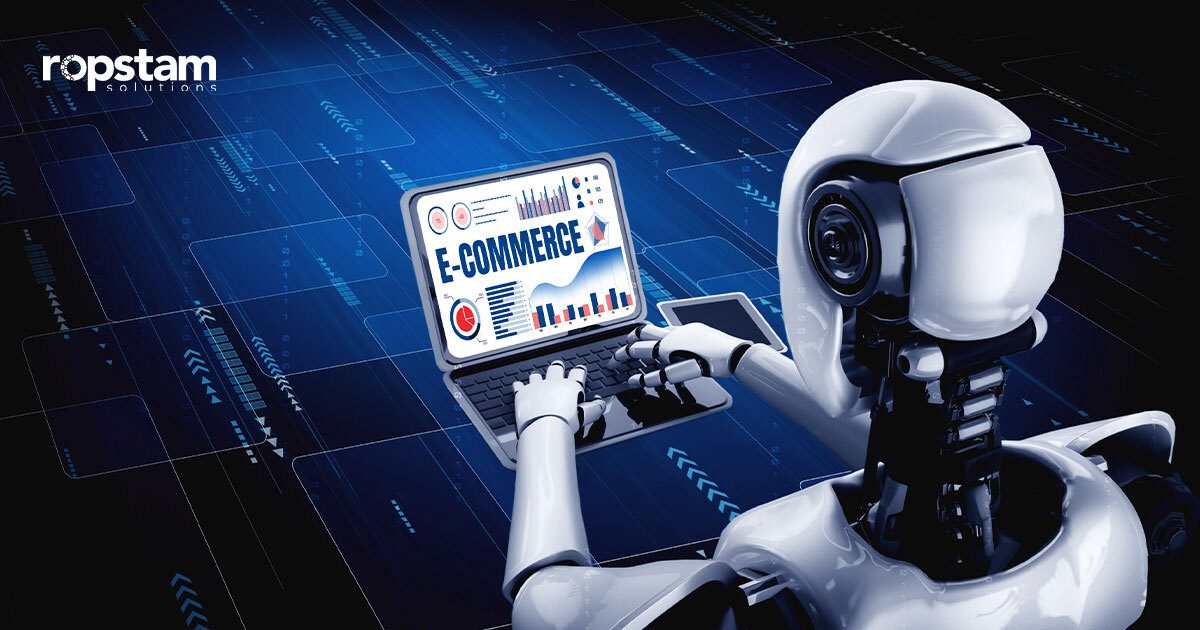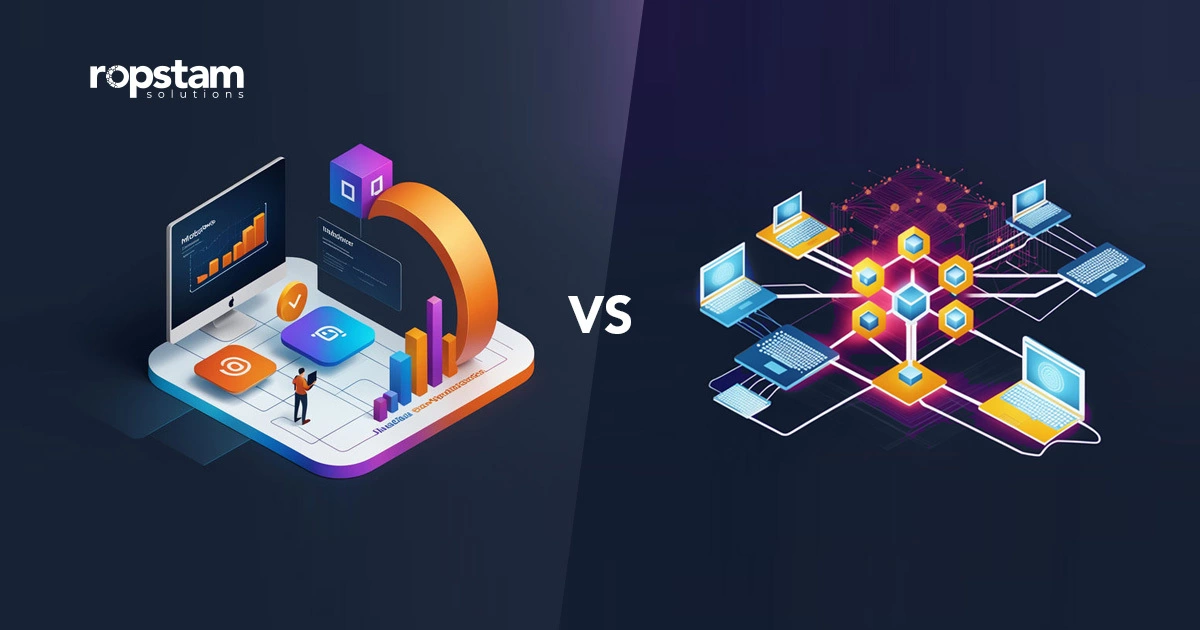The e-commerce industry has grown exponentially over the last decade, and it is estimated that sales from online stores will exceed $7.4 trillion by the end of 2025. In the ever-changing landscape of e-commerce, the role of Artificial Intelligence (AI) has evolved as a pivotal force, reshaping the industry’s operations.
From chatbots enhancing customer service to predictive analytics, the significance of AI (Artificial Intelligence) integration with ecommerce sites cannot be understated. This blog encapsulates the role of AI in the domain of Ecommerce, underlining the benefits and use cases of AI.
Importance of AI in the ecommerce industry
Artificial intelligence has become a transformative force across industries, and ecommerce is no exception. AI enables online retailers to gain unique insights into customer behavior and preferences, which is critical to success in the digital marketplace.
In today’s day and age, it’s more pertinent than ever before to comprehend and evaluate the significance and use cases of Artificial Intelligence in the domain of ecommerce. There are several key ways AI is driving progress in the ecommerce sphere. Some of them have been highlighted here:
- Personalization: Sophisticated AI algorithms analyze buyer history and browsing data to deliver tailored recommendations and customized experiences. This boosts conversions and engagement of your customers.
- Inventory and Supply Chain Management: AI tracks inventory levels in real time and automatically adjusts pricing or reorder levels as needed. It also optimizes logistics like delivery routes. This minimizes overstocking and stockouts.
- Chatbots and Virtual Assistants: AI-powered chatbots provide instant customer support and simulate human conversations, improving customer satisfaction. Voice assistants enable hands-free shopping.
- Fraud Detection: AI analyzes transaction data to identify patterns signaling fraudulent orders and minimize losses. Its self-learning abilities improve anti-fraud models over time.
- Search Optimization: AI can analyze search keywords and adjust site content, tags, and page ranking to optimize organic search results. As a result, users can find desired products more easily.
- Predictive Analytics: By analyzing data like past purchases, browsing history, seasonality, etc., AI can forecast demand more accurately and recommend optimum inventory levels.
- Marketing Automation: As an online business owner, you can leverage AI platforms to create targeted ads, send personalized promotions via email/SMS, and determine ideal channels and budgets for campaigns.
10 use cases of AI in ecommerce
There are a handful of famed ecommerce companies leveraging AI to enhance customer experience. Here, I have listed some of the most well-known use cases:
Ways in which AI is being used in ecommerce businesses
- Amazon’s product recommendation system
- Shopify’s Search Engine Optimization (SEO)
- Intelligent fraud detection by Alibaba
- Optimized search results using AI
- Limiting fake reviews
- Automated chatbots to the rescue
- Walmart’s sales forecasting system
- AI-based customer relationship management systems (CRMs)
- Voice Search
- Combatting fake products
1) Amazon’s product recommendation system
Amazon leverages the power of AI for its product recommendation system. The system analyzes a customer’s past purchases, browsing history, and other data to generate a list of products that the customer is likely to be interested in. Over the years, this has helped Amazon to increase its sales and become one of the largest ecommerce businesses in the world.
2) Shopify’s Search Engine Optimization (SEO)
Shopify uses AI to power its SEO tools. The tools substantially help businesses identify the right keywords to target, optimize their product descriptions, and improve the overall SEO of their websites. Consequently, it has helped Shopify merchants increase their organic traffic and sales by ranking higher in Google’s SERPs.
3) Intelligent fraud detection by Alibaba
Alibaba also leverages AI technology to enhance user experience. The AI-integrated system analyzes a variety of data points, such as the customer’s location, IP address, and spending history, to identify transactions that are likely to be fraudulent. By reducing fraudulent transactions and the number of fake users, Alibaba has become one of the most revered ecommerce stores across the globe.
4) Optimized search results using AI
If the user is not interested in the products displayed on the landing page, it’s more likely than not that the user will abandon the purchase process. Therefore, every ecommerce store owner aims to present personalized and customer-centric search results.
In this context, Yandex, a famed search engine, has integrated Artificial Intelligence to optimize their search results in order to enhance user experience. Pinterest is planning to collaborate with ecommerce stores to improve search results.

5) Limiting fake reviews
Customer reviews are one of the most important factors in the decision-making process of a user wanting to purchase an item from your ecommerce store. That is why it’s extremely pertinent to curb the fake reviews that have the potential to hinder the progress of your online store.
In the recent past, Yelp has leveraged the power of Artificial Intelligence to classify user reviews and flag fake ones. Similarly, Facebook has also developed an AI-based solution based on supervised and unsupervised learning to limit the number of fake reviews.
6) Automated chatbots to the rescue
While ChatGPT is the talk of the town, it is not the only example of an AI-powered chatbot used for live chat and other purposes. In the universe of ecommerce, a handful of business owners have utilized the potential of such chatbots to enhance customer service and increase their sales. The importance of automated chatbots responding to user queries is underscored by the fact that businesses have to spend up to $1.3 trillion per year in order to respond to customer calls manually.
California-based ecommerce giant eBay realized this a long time ago when they introduced a chatbot for responding to user queries. Now, eBay has a highly advanced ShopBot, which is an advanced version capable of reminding users of specific holiday-based sales.
7) Walmart’s sales forecasting system
Sales forecasting is perhaps one of the biggest innovations in the field of ecommerce. As a business owner, if you have a tool that predicts which products are more likely to be purchased at a particular time period, you can invest more in that category.
In today’s day and age, such predictions are possible thanks to the power of AI. The most common example is that of Walmart’s weather analytics, which can forecast the rise and fall in sales of grocery items depending upon the outside weather.
8) AI-based customer relationship management systems (CRMs)
Automated sales have become a hot trend in the modern era of online shopping. Today, Leading customer relationship management (CRM) platforms like Salesforce, SAP, Oracle, Microsoft, and Adobe have acquired or invested in AI startups to integrate artificial intelligence capabilities. For example, Salesforce launched Einstein, an AI tool designed to make AI more accessible for companies of all sizes.
Einstein enables a range of features powered by machine learning algorithms including lead prioritization, automated data entry, personalized recommendations, and social media sentiment analysis. This tool is directly responsible for the company’s increased sales and enhanced customer experience.
9) Voice Search
Voice search, powered by AI, is revolutionizing how companies connect with consumers. Leveraging this technology allows businesses to boost product promotion strategies. Retail giant Amazon’s Echo devices serve as an exemplar by integrating voice search for product exploration and purchases. Through commands like “Alexa, find office chairs,” users swiftly navigate through a wide array of options without lifting a finger.
Google Assistant and Apple’s Siri are also integrating voice-enabled search, presenting smoother access to products and services. Moreover, revered clothing retailer H&M implements voice-activated features, enabling customers to browse and buy using simple voice commands. This strategy enhances user experiences and influences purchasing decisions and you can even complete the transaction or clear the cart with voice commands.
10) Combatting fake products
AI is also employed to monitor and analyze customer reviews, determining if they are fabricated or manipulated. By examining language patterns and trends, algorithms can detect inauthentic reviews or ratings, ensuring a more transparent and reliable shopping experience for consumers.
Furthermore, companies like eBay and Shopify leverage AI in their verification processes, employing robust machine-learning models to screen products and ensure authenticity. Such measures protect the integrity of their platforms and safeguard the trust of their users, making it perfect for ecommerce businesses.
In short, AI’s evolving capabilities in detecting fake products not only enhance consumer confidence but also contribute to an ethical and secure online shopping environment.
10 benefits of AI in ecommerce
Here are some of the key advantages of integrating AI with your ecommerce platform:
1) Enhanced customer experience
AI empowers e-commerce platforms to offer tailored customer experiences, driving engagement and satisfaction. Utilizing AI-driven algorithms, companies can analyze customer data to generate personalized recommendations, ultimately improving customer retention and bolstering sales.
2) Improved operational efficiency
Automation facilitated by AI enhances various operational facets within e-commerce. Inventory management, logistics, and supply chain optimization benefit from AI’s ability to process and analyze large datasets swiftly, reducing errors and enhancing accuracy. Consequently, this results in cost savings and optimized processes in real-life inventories.
3) Optimized pricing strategy
AI-driven dynamic pricing models enable e-commerce platforms to adapt pricing strategies in real time based on market demand, competition, and consumer behavior. This innovative approach allows companies to remain competitive and maximize revenue while keeping the pricing strategies responsive.
4) Marketing strategies optimization
The integration of AI enables predictive analytics, offering invaluable insights into market trends, customer behavior, and preferences. Leveraging this data, e-commerce companies refine their marketing strategies, creating targeted campaigns that resonate with specific customer segments, improving conversion rates, and optimizing marketing spend.
5) Efficient customer support
AI-powered chatbots and virtual assistants have completely revolutionized customer support experiences. These virtual agents are responsible for providing instantaneous responses, assisting in navigating the platform, answering queries, and aiding in issue resolution.
This round-the-clock availability enhances customer satisfaction while reducing operational costs, ultimately generating more revenue for the business owner.
6) Demand forecasting and inventory management
Another key advantage of AI is its ability to aid in forecasting demand based on historical data, market trends, and customer behavior. This facilitates accurate inventory management, ensuring e-commerce companies stock the right products in the right quantities, reducing overstock or shortages.
7) Voice search integration
AI-powered voice assistants and search functionalities simplify the customer experience to a certain extent by allowing users to search, browse, and make purchases using voice commands. This enhances accessibility and convenience for customers, especially those using mobile devices.
This feature is also particularly handy for disabled persons, enabling them to navigate the landscape of online shopping without any hassle.
8) Recommendation engine refinement
AI also continuously refines recommendation engines by analyzing user behavior, preferences, and interactions. This leads to improved product suggestions, personalized content, and a higher likelihood of customers finding items of interest.
9) Adaptive website design
A responsive web design tailored to user preferences is key to attracting more customers. In this context, AI can optimize website layouts and content by analyzing user behavior and engagement. This results in an adaptive website design that dynamically adjusts to user preferences, substantially improving the overall user experience.
10) Marketplace expansion
Based on customer demands and the most recent trend, Artificial Intelligence enables e-commerce platforms to curate marketplace content and expand product assortments. This aids in creating diversified marketplaces tailored to specific customer needs and preferences.
Final Thoughts
The future belongs to Artificial Intelligence and like other industries, online business owners also leverage the potential of AI to increase the number of sales. AI offers a host of features that ecommerce sites can utilize to boost the online presence of the business and streamline the checkout process. This results in increased sales by attracting more customers.
At Ropstam Solutions, we have a skilled team of Shopify developers with years of experience in ecommerce websites development. With more than a decade of experience in this field, we have proudly delivered numerous projects in this domain to our satisfied clients. If you want to avail of our ecommerce services, contact us now.













